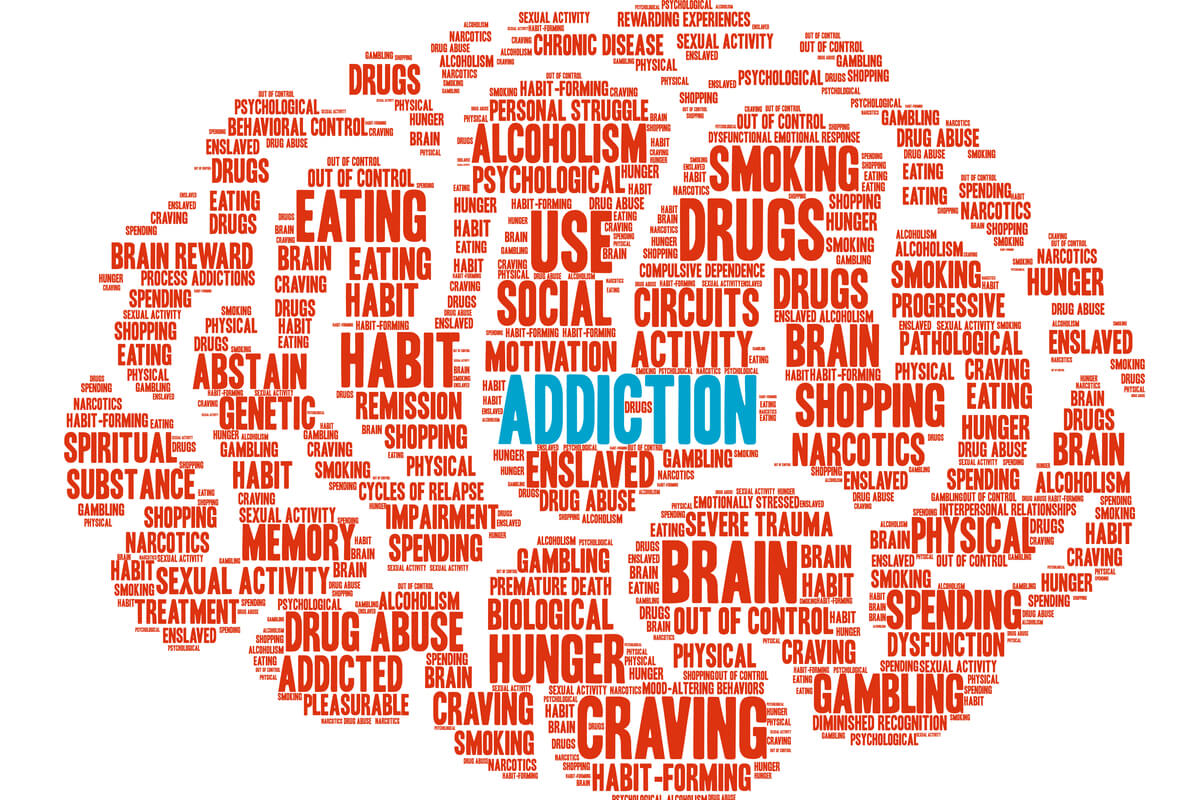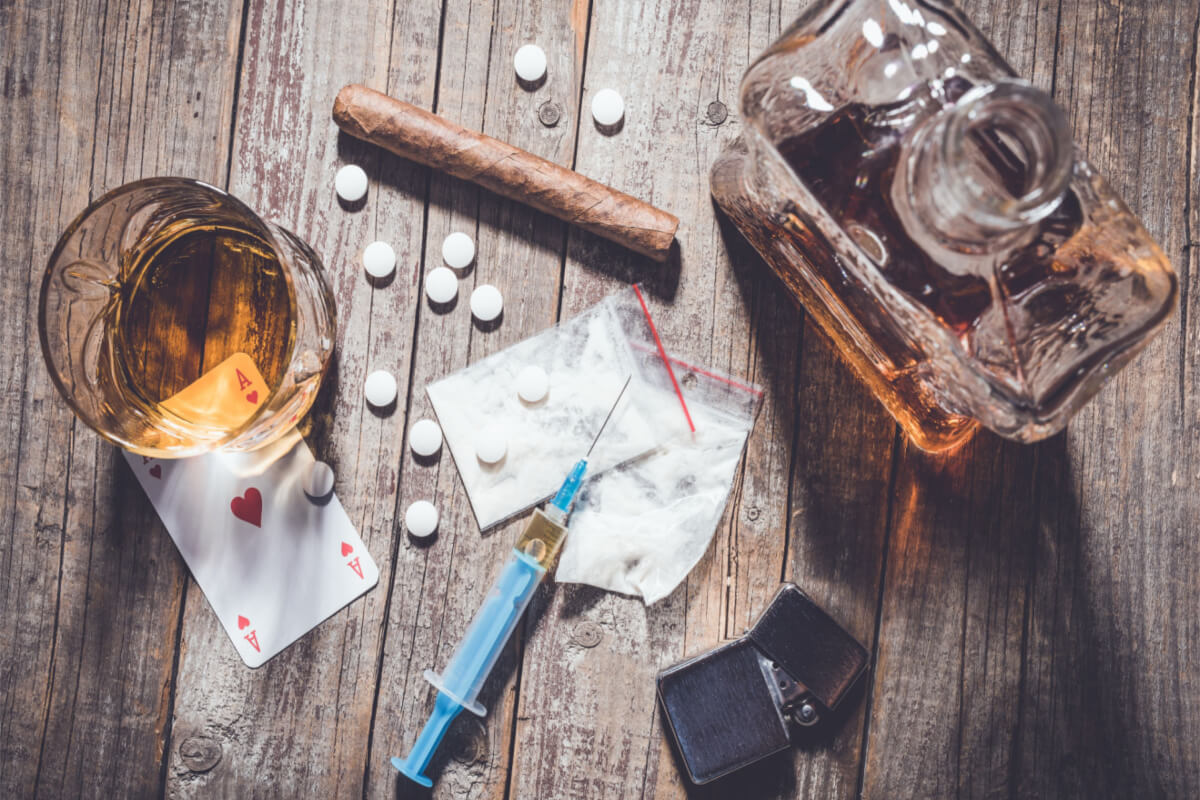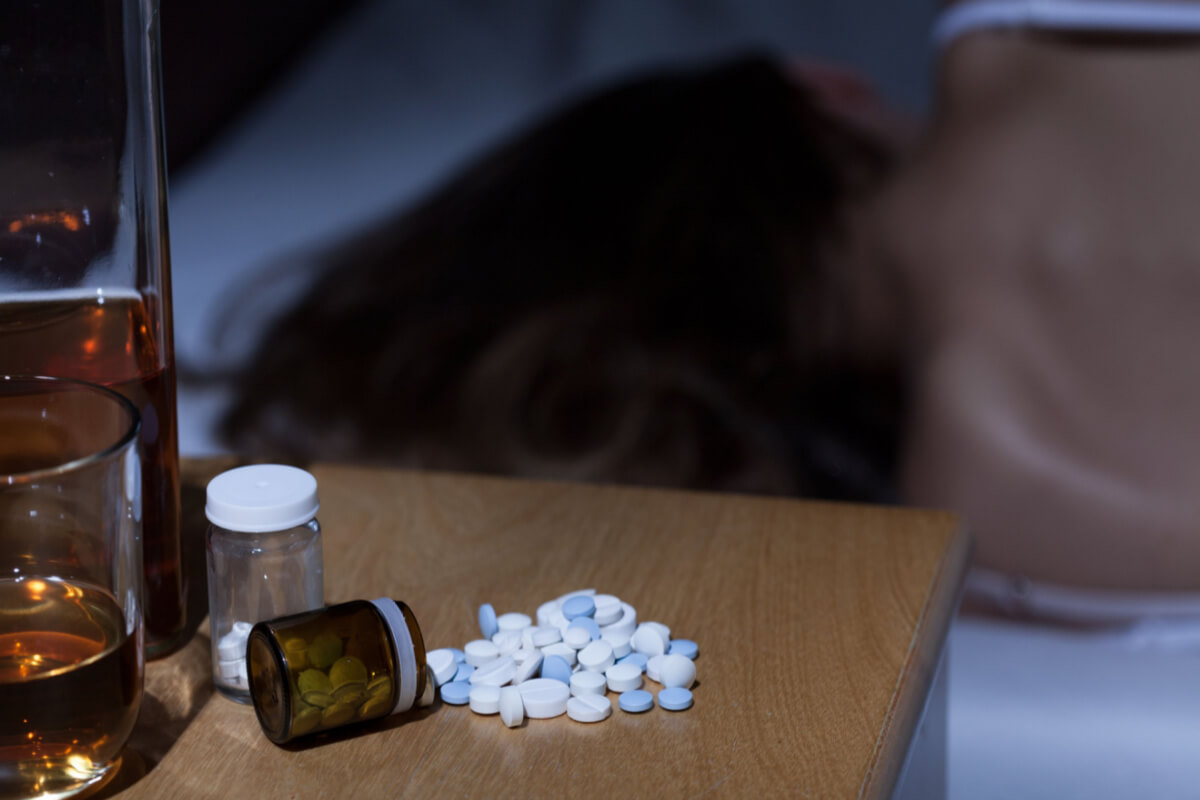
Health care workers and medical professionals are at a high risk for substance use disorder — more so than the general public. Some of the proposed reasons for this known risk are the high-stress nature of their profession, potential underlying mental health conditions, and easy access to controlled substances.
Rates of addiction among physicians are between 10% and 15% compared to between 8% and 10% in the general population.[1] Around 10% to 12% of physicians report a substance use disorder (SUD) at some point during their careers.[2] Similarly about one out of every five to seven registered nurses (RNs) in the United States (14% to 20%) report misuse of alcohol or drugs.[3] SUD are likely underreported in the medical community due to fear of legal or professional repercussions and therefore could actually be much higher than the statistics reflected here.
Substances Commonly Abused by Medical Professionals
Alcohol is the most used addictive substance in the United States. Alcohol use disorder (AUD) is the most common SUD.[4] This is true within the medical community as well.
Alcohol use is legal and is considered “socially acceptable” in a way that other drugs of abuse are not, alcohol as a form of release.
However, regular and excessive consumption of alcohol can lead to dependence and an eventual substance use disorder and can have as many if not worse repercussions on health as other illicit substances.
Doctors, nurses, paramedics, and medical professionals in general work long hours and face a fast-paced, high-intensity working environments. One study found that 13% of male physicians and 21.5% of female physicians met the criteria for alcohol misuse or dependence.[5]
Health care workers also have easy access to controlled substances and misuse opioids and benzodiazepines at higher rates than the general population.[6]
Why Might Medical Professionals Be At Higher Risk for SUD?
It is not known for sure what puts medical professionals at higher risk for SUD, but there are many possible theories:
First, Medical professionals often work long hours and must complete many years of training. The training can be isolating and put professionals at risk for anxiety, depression, or other mental health conditions that then prompts substance misuse. Nearly one out of every three doctors display symptoms of depression, and around 400 physicians die by suicide every year.[10] Studies have shown that health care workers have higher rates of mood disorders, anxiety disorders, sleep disorders, and psychiatric disorders than people in other occupations.[11]
Second, many hospitals or health care environments have a culture of social drinking with colleagues after work which may promote alcohol use or misuse.
Lastly, some professionals may use stimulant medications to help them during long shifts or grueling work hours. Finally, certain medical professionals may have more access to prescription medications that can ease pain, help with sleep issues, self-medicate mental health symptoms, manage stressful situations, and aid with focus and staying awake longer.
Anesthesiologists misuse substances at close to triple the rate of other physicians. Most often, opioids are the drug of choice.[8,9] This could be related to the fact that these medical professionals have the greatest access to these controlled substances. It could also potentially be due to secondhand exposure and therefore an increased sensitivity to opioid drugs.
Since these health care providers deal with these prescription painkillers on a regular basis, they may be more likely to misuse them and develop an opioid use disorder (OUD).
The Implications of SUD in Health Care Workers
Health care workers have an important role in our community as healers and helpers. Often, people’s lives literally depend on the decisions making and judgment of their clinicians. An impaired doctor or nurse is unable to react as quickly as necessary and make sound decisions. This can be catastrophic to the patients they are treating. Potentially life-threatening mistakes may be made. Therefore, substance misuse among medical professionals should be quickly identified and addressed. If a patient or co-worker suspects impairment, they should report this concern to authority figures as soon as possible.
Barriers to Treatment
Mental health conditions and substance use disorders still carry large stigma especially among medical professionals. Many medical professionals are afraid to step forward when facing an issue for fear of losing their job or having implications for their ability to practice medicine.
For this reason, many medical professionals will suffer in silence and not seek out treatment.
State boards can revoke medical licenses for malpractice incidentsFear of sanctions and punishment can keep doctors and nurses from seeking help, but without help, there are serious ethical and legal ramifications.
Warning Signs of Substance Misuse Among Medical Professionals
Behavioral signs of substance use disorder in medical professionals can include the following:
- Absences from the worksite for longer than necessary
- Changes in job performance
- Tardiness and/or leaving early and absenteeism
- Frequent bathroom trips
- Spending a lot of time near drug supply sites
- Making mistakes often, such as medication errors
- Isolation from coworkers
- Mood swings and inappropriate responses
- Memory lapses and confusion
- Less alertness
- Handwriting and charting deterioration and sloppy recordkeeping
- Unreliability
- Missed deadlines and appointments
- Not accepting blame for mistakes
- Interpersonal relationships becoming strained
- Shifts in personality
- Staff and coworkers complaining about their behavior or attitude
Physical signs of addiction include the following:
- Changes in appearance and lack of interest in self-care
- Wearing long sleeves when it is not appropriate or necessary
- Weight fluctuations
- Tremors
- Looking tired
- Needing to drink more or take more drugs to feel the effects
- Using more at a time than intended
- Inability to stop using despite several attempts
- Withdrawal symptoms when the drugs or alcohol process out of the body
Drug diversion signs include the following:
- Frequent corrections of medication records
- Incorrect narcotic counts
- Excessive “wastage” of drugs
- Drug shortages
- Patients reporting inadequate pain relief
- Offering to medicate patients of coworkers for pain
- Discrepancies among controlled substances that vary based on specific shifts or days of the week
- Phone or verbal medication orders that are altered
Treatment Options
Treatment methods should be specific to healthcare providers. Treatment providers will need to be familiar with the work environment and specific stressors that medical professionals work under.
Specialized treatment programs can be either inpatient or outpatient, depending on the level of care required. There are many programs designed specifically for health care providers (HCPs). Treatment programs can often help doctors and nurses to maintain their licenses and work within the system to protect their medical practice and their confidentiality while still getting them the help they need.
What to Do if You Suspect a HCP Is Abusing Alcohol or Drugs
If you suspect a HCP is misusing drugs or alcohol, you have an ethical and legal responsibility to act.[15] It is often not optimal to confront this person directly. Instead, contact the physician health program (PHP) in your state.[16] This can be done anonymously. The PHP can do an assessment and run an intervention when needed. The role of the PHP is to identify an impaired physician, get them into treatment, and provide continued monitoring.
Physicians who voluntarily seek and enter into treatment programs can have the PHP advocate for them before the medical board. If the state medical board becomes involved before the PHP, formal disciplinary action may be taken.
SUD Among Medical Professionals FAQs
Why do medical professionals have a higher risk of drug and alcohol misuse?
The stress of the job coupled with the intense environment and pressure to perform can increase the risk for drug and alcohol misuse. Long hours, sleep difficulties, the culture of alcohol and drug use, and ease of access to narcotics and other controlled substances are also factors.
What are the risks of an impaired physician?
An impaired physician is a risk to both themselves and to the patients they are treating. Mistakes can be potentially life-threatening in the medical field, leading to serious health complications or even death of a patient.
How do I report an impaired medical provider?
If you suspect an HCP is impaired or working under the influence of drugs or alcohol, you need to step forward. You should not attempt to speak to the colleague directly, but instead you should pursue standard legal channels: reach out to your state’s physician health program (PHP).[17]
Can a medical professional protect their job after treatment?
Yes. We want to encourage professionals to get better, not penalize them. Treatment for substance use and mental health disorders can be highly effective, especially for medical providers determined to protect their careers. If you go through a PHP and enter treatment before the medical board gets involved, medical licenses and jobs can often be retained.

By Elena Hill, MD, MPH
Elena Hill, MD; MPH received her MD and Masters of Public Health degrees at Tufts Medical School and completed her family medicine residency at Boston Medical Center. She is currently an attending physician at Bronxcare Health Systems in the Bronx, NY where ... Read More
- Op-Ed: Up to 15% of Doctors are Drug Addicts. I was One of Them. Los Angeles Times. https://www.latimes.com/opinion/op-ed/la-oe-grinspoon-addicted-doctors-20160605-snap-story.html. June 2016. Accessed February 2022.
- Chemical Dependency and the Physician. Mayo Clinic Proceedings. https://www.ncbi.nlm.nih.gov/pmc/articles/PMC2704134/. July 2009. Accessed February 2022.
- The Sneaky Prevalence of Substance Abuse in Nursing. Nursing 2022. https://journals.lww.com/nursing/Citation/2015/03000/The_sneaky_prevalence_of_substance_abuse_in.6.aspx. March 2015. Accessed February 2022.
- Alcohol. National Institute on Drug Abuse (NIDA). https://nida.nih.gov/drug-topics/alcohol. Accessed February 2022.
- The Prevalence of Substance Use Disorders in American Physicians. The American Journal on Addictions. https://pubmed.ncbi.nlm.nih.gov/25823633/. January 2015. Accessed February 2022.
- Impaired Healthcare Professional. Critical Care Medicine. https://pubmed.ncbi.nlm.nih.gov/17242598/. February 2007. Accessed February 2022.
- Reasons for Misuse of Prescription Medication Among Physicians Undergoing Monitoring By a Physician Health Problem. Journal of Addiction Medicine. https://pubmed.ncbi.nlm.nih.gov/24089039/. September–October 2013. Accessed February 2022.
- Substance Abuse in Anesthetists. Current Opinion in Anesthesiology. https://www.uptodate.com/contents/substance-use-disorders-in-physicians-epidemiology-clinical-manifestations-identification-and-engagement/abstract/8. April 2021. Accessed February 2022.
- Addiction and Substance Use in Anesthesiology. Anesthesiology. https://www.ncbi.nlm.nih.gov/pmc/articles/PMC2766183/. November 2008. Accessed February 2022.
- When Medical Professionals Face Mental Health Issues. Mental Health First Aid USA. https://www.mentalhealthfirstaid.org/2017/06/medical-professionals-face-mental-health-issues/. June 2017. Accessed February 2022.
- Mental Disorders Among Workers in the Healthcare Industry: 2014 National Health Insurance Data. Annals of Occupational and Environmental Medicine. https://www.ncbi.nlm.nih.gov/pmc/articles/PMC5934846/. May 2018. Accessed February 2022.
- Substance Use and Co-Occurring Mental Disorders. National Institute of Mental Health (NIMH). https://www.nimh.nih.gov/health/topics/substance-use-and-mental-health. Accessed February 2022.
- Doctors, Medical Staff on Drugs Put Patients at Risk. USA Today. https://www.usatoday.com/story/news/nation/2014/04/15/doctors-addicted-drugs-health-care-diversion/7588401/. April 2014. Accessed February 2022.
- A Nurse’s Guide to Substance Use Disorder in Nursing. National Council of State Boards of Nursing. https://www.ncsbn.org/SUD_Brochure_2014.pdf. July 2014. Accessed February 2022.
- Drug Addiction in Healthcare Professionals. Drug Enforcement Administration (DEA). https://www.deadiversion.usdoj.gov/pubs/brochures/drug_hc.htm. Accessed February 2022.
- Identifying an Impaired Physician. AMA Journal of Ethics. https://journalofethics.ama-assn.org/article/identifying-impaired-physician/2003-12. December 2003. Accessed February 2022.
- State Programs. Federation of State Physician Health Programs.https://www.fsphp.org/state-programs. 2018. Accessed February 2022.
Download Our Free Program Guide
Learn about our program, its effectiveness and what to expect
Related articles
Imagine what’s possible on the other side of opioid use disorder.
Our science-backed approach boasts 95% of patients reporting no withdrawal symptoms at 7 days. We can help you achieve easier days and a happier future.









